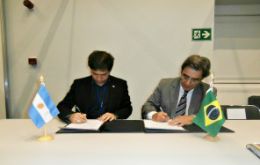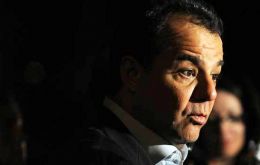MercoPress. South Atlantic News Agency
Brazil
-
Monday, March 31st 2014 - 19:25 UTC
Brazil/Argentina agree on deal to promote bilateral trade by guaranteeing 'dollar liquidity'

Brazil and Argentina signed a deal over the weekend that seeks to guarantee importers will have enough U.S. dollars to pay for exports, a move to increase trade between both nations that has been hit hard by a sharp depreciation of the Argentine peso.
-
Monday, March 31st 2014 - 16:13 UTC
Latam forecasted to grow 3% this year, but fiscal deterioration is serious

Latin America and the Caribbean’s economy as a whole will grow by 3% this year and 3.3% in 2015 thanks to “improved economic conditions in the United States and Europe”, the Inter-American Development Bank said in a report released over the weekend.
-
Monday, March 31st 2014 - 13:02 UTC
Federal troops move into Rio favelas to secure access to Galeao airport

Brazilian police backed by troops occupied a massive favela next to Rio de Janeiro's international airport without firing a shot to secure one of the city's most violent neighborhoods long run by drug dealers.
-
Saturday, March 29th 2014 - 06:17 UTC
Support for Rousseff faltering, but still the strongest candidate for October's election

Support for Brazilian President Dilma Rousseff has faltered ahead of October's presidential election, a poll showed Thursday, although she remains a favorite to win a second term.
-
Saturday, March 29th 2014 - 06:11 UTC
Brazil's 2,3% growth in 2013 came as a surprise, even for Minister Mantega

Brazil's economy expanded 2.3% in 2013, compared with growth of 1% the previous year, the Brazilian Institute of Geography and Statistics, IBGE, said this week. The country's GDP for 2013 was estimated at 4.84 trillion Reais (some 2.05 trillion dollars), the IBGE said.
-
Thursday, March 27th 2014 - 08:16 UTC
Petrobras scandalous purchase of US refinery should be addressed by Congress

Former Brazilian president Fernando Henrique Cardoso said Congress should investigate a growing scandal surrounding the controversial 2006 purchase by oil giant Petrobras of a Texas refinery.
-
Thursday, March 27th 2014 - 08:07 UTC
Brazil lower house approves internet legislation to ensure privacy and neutrality

The lower house of Brazil’s Congress has approved legislation meant to ensure the privacy of Internet users and to guarantee what is called “Internet neutrality”, that all content be treated equally by carriers. But it dropped a demand that all data on Brazilians be saved within the country.
-
Wednesday, March 26th 2014 - 07:44 UTC
Brazil hits back at S&P; says economy is well positioned to new challenges in the global scenario

Brazil's central bank on Tuesday said it will continue to respond to challenges in the international scenario after Standard & Poor's decision to downgrade the country's credit ratings. This includes a rigorous set of macroeconomic policies, a flexible exchange rate regime and the use of liquidity buffers “to smooth out moves in asset prices” the bank said in a statement.
-
Tuesday, March 25th 2014 - 08:59 UTC
Brazil militarizes favelas in Rio do Janeiro to guarantee 'law and order'

The Brazilian government announced on Monday, 80 days before the start of the 2014 World Cup, that the military will help occupy several “favelas,” or shantytowns, in Rio de Janeiro to guarantee security in an area currently controlled by violent drug trafficking outfits where some 100,000 people live.
-
Tuesday, March 25th 2014 - 08:51 UTC
S&P downgrades Brazil’s sovereign debt rating to BBB minus

Standard & Poor's cut Brazil's sovereign debt rating closer to speculative territory in a blow to President Dilma Rousseff administration. Brazil had its long-term debt rating downgraded to BBB minus, the agency's lowest investment-grade rating. S&P changed its outlook to stable from negative, meaning further downgrades are unlikely for now, which will come as a relief for both politicians in Brasilia and financial markets.The move was widely expected but the timing surprised some investors.
